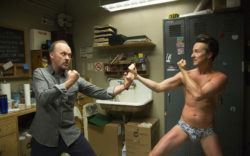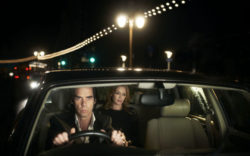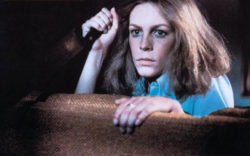BEFORE MIDNIGHT (R) It’s been nine years since we last visited Celine (Julie Delpy) and Jesse (Ethan Hawke) after their reunion in Before Sunset, and 18 years since first meeting the two young lovers on a train heading toward Vienna in Before Sunrise. Now a fortysomething couple with two young daughters, Jesse, a novelist, and Celine, an environmental activist, have been spending six lovely weeks in Greece as guests of a writer and his family. Plentiful sun, excellent food and wine, good conversations and camaraderie with new friends have made the vacation memorable. But when Jesse and Celine get an opportunity to spend a night together at a hotel away from their children, the tension in their relationship snaps.
Before Midnight, the third entry in this radiant and increasingly emotionally complex series, is a remarkable experience. Whereas the first and second movies—released in 1995 and 2004 respectively—were examinations of love blossoming and then thickened with layers of worldly experience, Before Midnight focuses on how the romance in Celine and Jesse’s relationship has tempered to a large degree and grown fainter under the weight of parental and career obligations and disappointments. The couple are still engaged with each other physically and mentally, still thankfully willful participants in their lives. One of the great primary aspects of the series has been dialogue (the last two movies written by Linklater, Hawke and Delpy) and the seemingly loose, improvised, organic manner in which Celine and Jesse interact. At times, their conversations are too intimate, too nakedly honest, as if we’re eavesdropping on a couple just a few inches from us, hearing things that we shouldn’t from strangers yet knowing that we discuss the same things with our own partner. The rhythm of Celine and Jesse’s discourse here—ranging from the mutability of love to the responsibility of being a parent to being sexually attractive in middle age to the frustrations of not living your life on your own terms—is vital, brutally honest and unlike anything else portrayed in current American cinema.
Director Richard Linklater has never been a showoff filmmaker. But what stands out here is his complete confidence in his actors and how assuredly he constructs each scene to mirror the ebb and flow of their conversation, allowing scenes to begin as lighthearted drama, dip into comedy, then smack of poignant truth. This is subtle, masterful filmmaking and the best American movie of the year so far.
Like what you just read? Support Flagpole by making a donation today. Every dollar you give helps fund our ongoing mission to provide Athens with quality, independent journalism.










